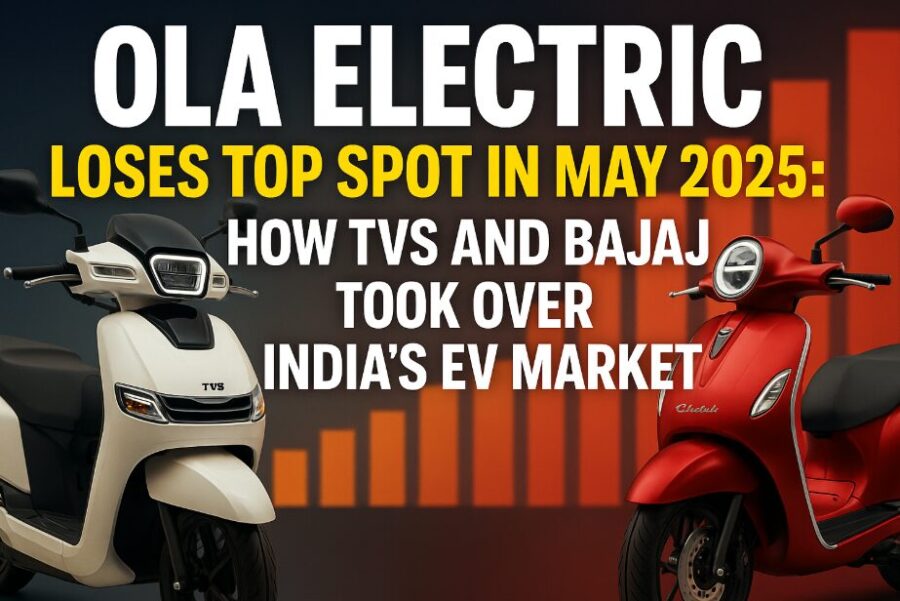Overview
- TVS Motor Leads EV Segment: With a 25% market share, TVS tops May 2025 registrations at 19,451 units.
- Bajaj Auto Overtakes Ola: Chetak sales propel Bajaj to second place with 22.6% share.
- Ola Falls to Third Spot: Market share plummets from 49.2% (May 2024) to 20% in May 2025.
- Upcoming Rivals Loom: Ather and Hero MotoCorp gaining ground; segment churn expected.
Introduction
Once hailed as the undisputed leader in India’s electric two-wheeler space, Ola Electric now finds itself playing catch-up. In a stunning turn of events, TVS Motor and Bajaj Auto have overtaken Ola in terms of market share in May 2025. While Ola still maintains a strong third position, its fall from a 49.2% market share a year ago to 20% today signals deeper cracks in its strategy, execution, and consumer trust.
Let’s dive into the numbers and reasons behind this major churn.
May 2025 EV Two-Wheeler Market Share Table
| Rank | Brand | May 2025 Units | Market Share (%) | May 2024 Share (%) | April 2025 Share (%) |
|---|---|---|---|---|---|
| 1 | TVS Motor | 19,451 | 25.0 | 15.6 | 22.3 |
| 2 | Bajaj Auto | 17,167 | 22.6 | 12.1 | 21.4 |
| 3 | Ola Electric | 15,221 | 20.0 | 49.2 | 22.1 |
| 4 | Ather Energy | 9,962 | 13.1 | 8.1 | 14.9 |
| 5 | Hero MotoCorp | ~5,400 | ~7.0 | — | 7.0 |
What Went Wrong for Ola Electric? — A Constructive Perspective
Ola Electric’s meteoric rise was powered by bold pricing strategies, eye-catching product launches, and a pioneering position in India’s EV space. While the brand has faced some challenges recently, these hurdles also offer valuable lessons and opportunities for growth:
- Product Reliability Concerns: Early feedback highlighted some quality and performance issues, especially under demanding conditions. However, this presents a clear path for Ola to prioritize rigorous quality checks and continuous product refinement, building stronger customer trust over time.
- After-Sales Service Gaps: Inconsistent service experiences have been reported, a common growing pain for many fast-scaling companies. By investing in service infrastructure and staff training, Ola can transform this weakness into a competitive advantage with a reliable and customer-centric support network.
- Regulatory Red Flags: Reports of certain dealerships lacking proper certifications have affected confidence but also underscore the need for tighter compliance and transparent operations — an essential step for any brand aiming for long-term credibility.
- Stalled Expansion Plans: While the ambitious lithium-ion cell production capacity plan is currently on hold, the allocation of ₹1,277 crore reflects Ola’s strong vision for supply chain independence. With market dynamics evolving, this investment can be reactivated strategically once conditions are more favorable.
TVS and Bajaj: Silent Achievers, Now Market Leaders
In stark contrast, TVS and Bajaj have played the long game, focusing on consistent product refinement, distribution expansion, and customer satisfaction.
- TVS iQube’s Rise: With 25% share and 19,451 units sold, the iQube’s feature-packed variants and city-friendly design are clicking with buyers.
- Chetak Comeback: Bajaj’s Chetak, especially the new 3503 variant priced at ₹1.10 lakh, has pushed the company to 17,167 units and a 22.6% market share. That’s a YoY leap from just 12.1%!
These brands are now benefiting from years of ICE dominance, manufacturing prowess, and growing EV experience.
What Lies Ahead: Ather, Hero, and the Next Wave
Ola’s dip is significant, but it isn’t terminal — yet. However, with Ather Energy securing 13.1% share and Hero MotoCorp launching its affordable Vida VX2, the road ahead is anything but smooth.
Ola must now go back to the drawing board — improve service quality, rebuild brand trust, and urgently execute delayed manufacturing plans if it wants to reclaim the crown.
Conclusion: A Market in Flux, a Lesson in Resilience
May 2025 marks a defining moment for India’s electric two-wheeler space. The segment is no longer about hype — it’s about consistency. Ola Electric’s fall from the top shows how quickly fortunes can turn in a competitive and rapidly maturing industry.
As TVS and Bajaj consolidate their positions, the race is heating up — and consumers, ultimately, stand to gain the most.

